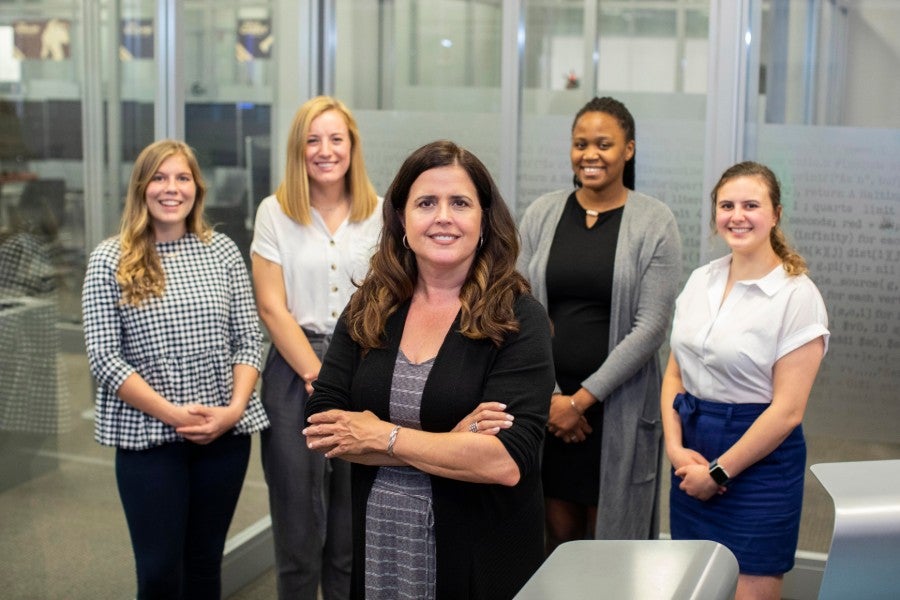MBA alumna uses her business sense to bring more women to tech
Marla Lamont, president of Women in Technology Tennessee, works tirelessly to raise the almost $50,000 in scholarships WITT awards to girls each year.
Janel Shoun-Smith | 615.966.7078 |

Each year students in Lipscomb's College of Computing & Technology are mentored by tech professionals in WITT, Women in Technology Tennessee. Marla Lamont (center) is the president of WITT and supports the mentor and scholarship programs of the organization.
2022 Update: The College of Computing and Technology is now the School of Computing and the School of Data Analytics and Technology.
Marla Lamont (MBA, ’15) began working in the telecom industry at the start of the millennium, and at the time, she had no idea that she would someday be in part responsible for hundreds of young women making their own way into technology industries.
Lamont, now director of talent acquisition at HCA, has been president of Women in Technology Tennessee since October of 2017 and has worked tirelessly for at least five years before that in raising money for the almost $50,000 in college scholarships the organization awards to girls each year.
One of her can’t miss events each year is the Adventure Science Center’s TWISTER event, a one-day conference for high school girls presented by women working in STEM careers. Lamont presents two scholarships to participants at TWISTER, which stands for Tennessee Women in Science, Technology, Engineering & Research.
“Getting to announce the winners of the scholarships to them at the actual event, just getting to see the look on their faces makes me feel really good about what I do and how I am affecting someone’s life,” said Lamont. “When you read the applications, see the challenges they have already overcome and understand how much they could achieve with the money, it makes me very passionate about it.”
Lamont first worked in the telecom industry beginning in 2000, but when she switched gears to move into IT recruiting in 2005, she became acutely aware of the lack of women in the IT industry and the lack of female candidates to fill IT spots.
The realization inspired her to become part of WiTT in 2004. At that time, WiTT had only been established for six years and was primarily focused on networking and encouragement of members to overcome the struggles of a male-dominated field.
But the group started raising a little money for scholarships and now offers not only the scholarships but also an annual coding camp, programs within the schools, sponsorship of a girls’ robotics team at Merrol Hyde Magnet School and two mentorship programs at Lipscomb University and Middle Tennessee State University.
Lamont became more involved with WiTT, first being elected to the board, then becoming Director of Sponsorships, then Vice president and now President until December 2019. She will continue to be heavily involved in WiTT activities as past president for the next two years.
This past winter, Lamont was excited to personally deliver a batch of the books Hidden Figures to Stratford STEM Lower School and to sponsor their participation in Engineering Day activities at Lipscomb University when Hidden Figures’ author Margot Lee Shetterly spoke for the students.
In January 2019, The Nashville Technology Council awarded Lamont the Community Leader of the Year Award, which recognizes local leaders who are “making Nashville the destination for creative and innovative technology.”
“We want to revolutionize the experience of women in tech and establish a new standard of inclusion for tech culture and leadership,” said Lamont of WiTT. “It is so important to reach girls at a young age to get them interested in tech and we are focusing on outreach programs for STEM initiatives and coding clubs, among other things, in the middle school and high school arena.”
Diversity and collaboration sparks more innovation and quality performance, Lamont said, so it’s crucial that more women make their way into tech fields, which is still not happening in the numbers needed, she said.
The National Center for Women and Information Technology reports that in 2017, only 26 percent of the computing workforce were women, and the number of women earning degrees in comp science has been steadily decreasing since 1990.
At the same time, by 2026, 3.5 million computing related jobs are expected, at the current rate, only 17 percent of these jobs could be filled by U.S. computing graduates, Lamont said.
“We need you as women to get computer science degrees and to get one of those 3.5 million jobs,” said Lamont. “Having the diversity of thought that a woman brings to a company can only be a good thing. The way women approach problems is different from a man, so having a different approach will only be an advantage.”
Want to know more about Lipscomb's College of Business? Visit www.lipscomb.edu/business.